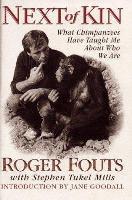
This is one of the best books I have ever read. In an account of Fouts’ experiences teaching chimpanzees to communicate through sign language, he exposes many heartbreaking injustices of animal research that escapes public attention. Even more importantly, to me, he reveals the striking intelligence and “humanity” of great apes and their tremendous capacity to feel emotions and think critically. It is important to note that the book is written through the bias of a man who has befriended chimpanzees for life; however, much of what he describes is backed up by convincing evidence, leading me to truly believe this book. The accounts of chimpanzees, their ability to withstand horrifying situations, and to remember with gratitude those who once helped them, is truly touching. I also enjoyed the scientific discussions interspersed within the narrative elements of the book. For anyone looking to reaffirm their convictions of animals’ feelings or for anyone looking to challenge their current opinion, I would highly recommend this book.
Reviewer Grade: 12
As an introvert, reading this book felt like coming home. There were many times when I so identified with the feelings and behaviors Susan describes it was like looking into a mirror. Cain examines different facets of personality and why we as a society value certain traits over others. She also looks at what introverts can offer to businesses and in leadership positions. Great read for introverts and extroverts alike!
Your Brain: The Missing Manual is the book for "the rest of us" who don't want to or can't take in all the medical jargon that usually infests books about how the "little grey cells" work.
Matthew MacDonald takes the information about how the brain functions and breaks it down into usable chunks. He gives a brief but thorough explanation of several functions the brain performs in simple English, then explains how the brain's owner can make the best use of how the brain works. An analogy would be that instead of someone trying to explain what's under the hood of that great car, he shows you the control panel and HOW TO USE the car. Chances are, you don't need to know how many cylinders there are, what kind of oil it uses etc. because all you plan to do is USE the car and maybe do a bit of maintenance. Matthew MacDonald's approach is that of someone explaining just enough of how the brain functions so that it can be used more efficiently and to the owner's benefit. I heartily recommend the book, especially to staff and teens who could use the problem solving techniques the author includes in the book for learning, school problem solving, etc.
That something so important could come out of the holocaust is amazing. I can imagine Dr. Frankl studying and analyzing the psychology of survival in his head while a prisoner, and then finally writing and publishing his greatest achievement. Logotherapy is a sound explanation on the meaning of life. Great book.
I only read half of this book. The writing style was too jumpy/jumbled for me. I felt that Laurence Gonzales was repeating the same things over and over. I did like the survival (or in some cases non-survival stories) and wished there had been more of those with the follow-up to the incident instead of so much description of the brain functions of survival. This was just an okay book for me.
Great for the reader interested in history, science, and adventure. A wonderful insight into Theodore Roosevelt's lifelong love for nature.
Great book. Dr. Dawkins takes everyday questions and answers them both via myth and via science in a manner that is accessible to the average layperson. The height of the book for me was the discussion of "Sod's Law" and the understanding that reacting as if there is a threat when the possibility arises assures survival. Also, I thought it was interesting that we are living the good life (at least I am), and natural selection favors a struggle. The illustrations were also great. A big thumbs up!
Explore an uncharted tributary of the Amazon River with President Theodore Roosevelt in The River of Doubt by Candice Millard. The adventure encompasses United States history, South American politics, native populations along the Amazon, and the relationship that President Roosevelt had with his son. Learn about the animals and plants along the dangerous Amazon and the near death of the President.
I started out giving this book 4 stars - it is a fascinating inside look at this author's hospitalization for a rare autoimmune disorder which caused her complete memory loss of the time she was ill and could have eventually led to her death had her doctor given up on her.
The more I think about this book, however, the more I liked it - I've found myself talking about it with friends and family over the past few days and marveling at this author's tenacity on recreating her "month of madness" through interviews and tapes. I feel this is a wonderful and well-written book, not only of one woman's experiences with an illness that displayed itself so quickly and violently, but a fascinating look into our brains and how they work (or don't work).



 Ruth Holley Library will be temporarily closed for approximately one week starting Mon., Dec. 2 to complete roof repairs.
Ruth Holley Library will be temporarily closed for approximately one week starting Mon., Dec. 2 to complete roof repairs.